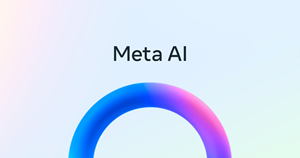Meta's AI Revolution: Speed, Personalization, and the Future of Interaction
May 3, 2025, 2:35 am
Meta Platforms, Inc. is making waves in the AI landscape. With the launch of its Llama API and the new Meta AI app, the company is not just keeping pace; it’s setting the tempo. This dual approach is reshaping how developers and consumers interact with artificial intelligence.
At the heart of this transformation is speed. Meta’s partnership with Cerebras Systems has birthed the Llama API, which boasts an astonishing processing speed of 2,600 tokens per second. This is a game-changer. Traditional GPU-based solutions lag far behind, processing only a fraction of that speed. Imagine a race where one car zooms ahead while others crawl. That’s the current state of AI inference.
Meta’s Llama API is not just about speed; it’s about redefining possibilities. Developers can now create real-time agents and low-latency voice systems. Tasks that once took minutes can now be completed in seconds. This leap in performance opens doors to new applications that were previously deemed impractical. The potential is vast, and the implications are profound.
But speed alone doesn’t win the race. Personalization is the new frontier. The Meta AI app, powered by Llama 4, aims to create a more intimate user experience. It’s designed to learn user preferences and maintain conversation context. This isn’t just another chatbot; it’s a companion that evolves with you. Users can engage in natural, flowing conversations, generating images and ideas seamlessly.
The app’s “Discover” section is a treasure trove of creativity. Users can browse prompts and ideas shared by others, fostering a community of innovation. This peer-sharing dynamic is a clever move. It transforms AI from a solitary tool into a social experience. It’s not just about getting answers; it’s about engaging with a community.
However, the app is not without its flaws. Initial tests reveal limitations in basic reasoning tasks. Miscounts and incorrect evaluations remind us that even advanced AI can stumble. This is a crucial point. While Meta aims for seamless interaction, the technology still has room for improvement.
The integration of the Meta AI app with Ray-Ban smart glasses further blurs the lines between digital and physical interaction. Users can transition from their glasses to the app, maintaining conversation history. This continuity is essential in a world where multitasking is the norm.
Meta’s broader vision is clear. The company is not just building tools; it’s crafting an ecosystem. By positioning itself as a leader in both consumer and developer spaces, Meta is setting the stage for a new era of AI interaction. The emphasis on open-source models aims to foster innovation while ensuring American leadership in AI standards.
As Meta ventures deeper into the AI realm, it’s clear that the stakes are high. The competition is fierce, with players like OpenAI and Google already established. Yet, Meta’s unique position—backed by billions of users and extensive data centers—gives it a significant advantage. The company is not just a participant; it’s a contender.
The implications for businesses are monumental. As consumers become accustomed to personalized, conversational AI, expectations will shift. Companies that fail to adapt risk being left behind. The Meta AI app is not just a product; it’s a harbinger of change. It signals a shift in how consumers will interact with technology, and businesses must take note.
In a world where AI is becoming a staple of daily life, the demand for responsive, intelligent systems will only grow. Enterprises must rethink their strategies to incorporate AI into customer experiences. The bar is being raised, and those who don’t keep up will find themselves outpaced.
Meta’s dual approach—speed through the Llama API and personalization via the Meta AI app—positions it at the forefront of this revolution. The company is not merely responding to trends; it’s shaping them. The future of AI interaction is here, and it’s faster, smarter, and more personal than ever before.
In conclusion, Meta is redefining the AI landscape. With its focus on speed and personalization, the company is setting new standards for interaction. As developers and consumers embrace these innovations, the potential for AI to transform our lives is limitless. The race has begun, and Meta is leading the charge. The question is, who will keep up?
At the heart of this transformation is speed. Meta’s partnership with Cerebras Systems has birthed the Llama API, which boasts an astonishing processing speed of 2,600 tokens per second. This is a game-changer. Traditional GPU-based solutions lag far behind, processing only a fraction of that speed. Imagine a race where one car zooms ahead while others crawl. That’s the current state of AI inference.
Meta’s Llama API is not just about speed; it’s about redefining possibilities. Developers can now create real-time agents and low-latency voice systems. Tasks that once took minutes can now be completed in seconds. This leap in performance opens doors to new applications that were previously deemed impractical. The potential is vast, and the implications are profound.
But speed alone doesn’t win the race. Personalization is the new frontier. The Meta AI app, powered by Llama 4, aims to create a more intimate user experience. It’s designed to learn user preferences and maintain conversation context. This isn’t just another chatbot; it’s a companion that evolves with you. Users can engage in natural, flowing conversations, generating images and ideas seamlessly.
The app’s “Discover” section is a treasure trove of creativity. Users can browse prompts and ideas shared by others, fostering a community of innovation. This peer-sharing dynamic is a clever move. It transforms AI from a solitary tool into a social experience. It’s not just about getting answers; it’s about engaging with a community.
However, the app is not without its flaws. Initial tests reveal limitations in basic reasoning tasks. Miscounts and incorrect evaluations remind us that even advanced AI can stumble. This is a crucial point. While Meta aims for seamless interaction, the technology still has room for improvement.
The integration of the Meta AI app with Ray-Ban smart glasses further blurs the lines between digital and physical interaction. Users can transition from their glasses to the app, maintaining conversation history. This continuity is essential in a world where multitasking is the norm.
Meta’s broader vision is clear. The company is not just building tools; it’s crafting an ecosystem. By positioning itself as a leader in both consumer and developer spaces, Meta is setting the stage for a new era of AI interaction. The emphasis on open-source models aims to foster innovation while ensuring American leadership in AI standards.
As Meta ventures deeper into the AI realm, it’s clear that the stakes are high. The competition is fierce, with players like OpenAI and Google already established. Yet, Meta’s unique position—backed by billions of users and extensive data centers—gives it a significant advantage. The company is not just a participant; it’s a contender.
The implications for businesses are monumental. As consumers become accustomed to personalized, conversational AI, expectations will shift. Companies that fail to adapt risk being left behind. The Meta AI app is not just a product; it’s a harbinger of change. It signals a shift in how consumers will interact with technology, and businesses must take note.
In a world where AI is becoming a staple of daily life, the demand for responsive, intelligent systems will only grow. Enterprises must rethink their strategies to incorporate AI into customer experiences. The bar is being raised, and those who don’t keep up will find themselves outpaced.
Meta’s dual approach—speed through the Llama API and personalization via the Meta AI app—positions it at the forefront of this revolution. The company is not merely responding to trends; it’s shaping them. The future of AI interaction is here, and it’s faster, smarter, and more personal than ever before.
In conclusion, Meta is redefining the AI landscape. With its focus on speed and personalization, the company is setting new standards for interaction. As developers and consumers embrace these innovations, the potential for AI to transform our lives is limitless. The race has begun, and Meta is leading the charge. The question is, who will keep up?


